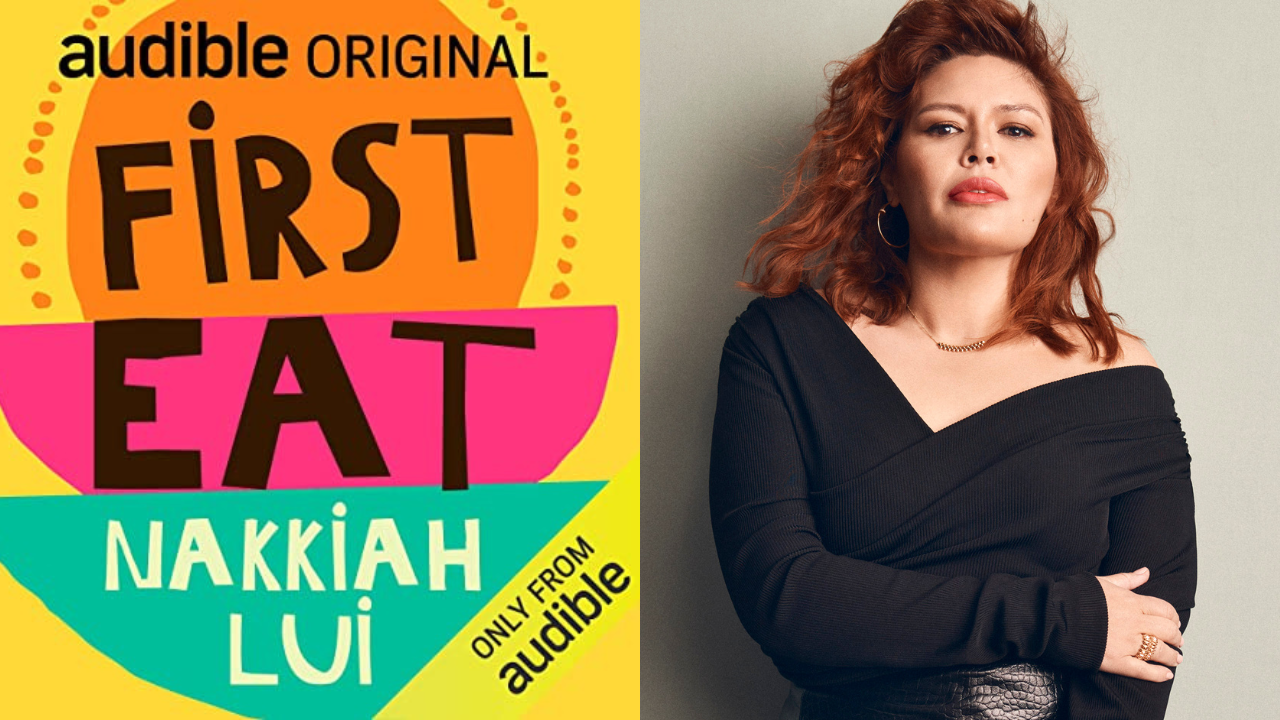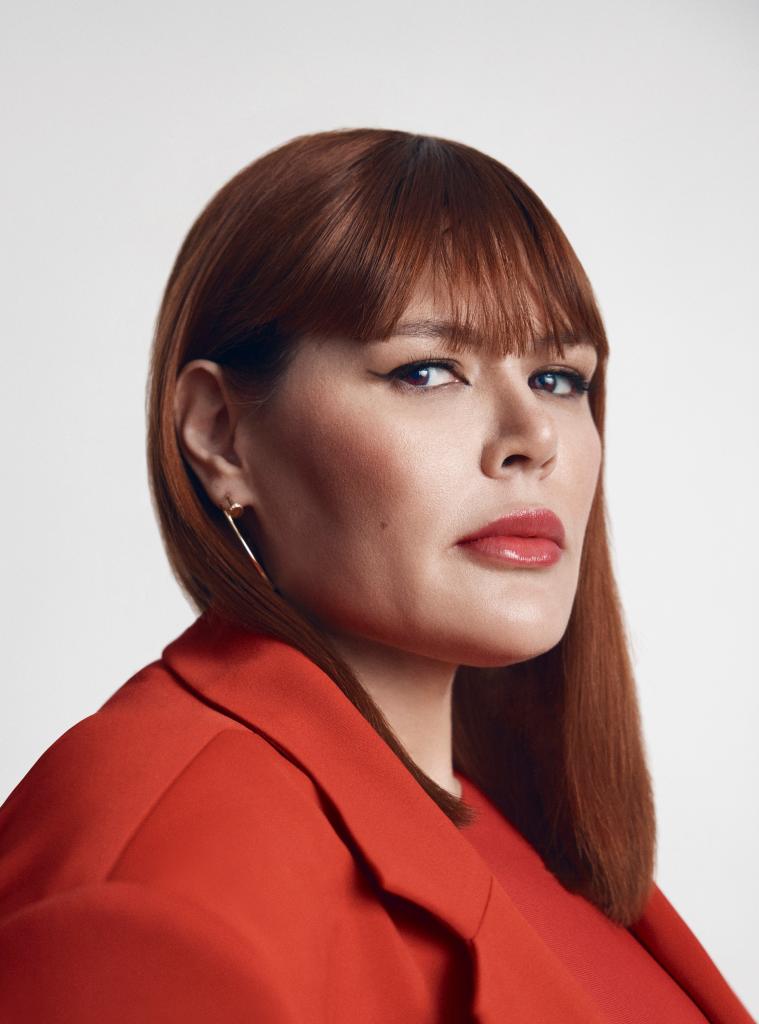
When Nakkiah Lui was pregnant with her soon-to-be one-year-old daughter Lux, she became fixated on food. But while food cravings are a normal part of pregnancy, Nakkiah’s mind wasn’t occupied by a hankering for weird snacks or meals that made her want to barf at the thought of them. Her fixation centered on what a plate of food would look like if First Nations people owned the land we lived on.
As the proud Gamilaroi and Torres Strait Islander woman prepared to bring new life into this world, she saw herself questioning how she can nourish and sustain her child, helping her grow up to be strong and empowered. But what started as a simple question about a plate of food on the table, turned into a deeply private yet politically intersectional journey that sent the seasoned podcaster, writer, actor, and comedian, and her producer, Nicola Harvey, all around the world.
They documented this journey in a podcast series on Audible aptly named First Eat.
“I come from a very politically active family,” Nakkiah told me, as we chat over the phone.
“I know where I am from, the land I grew up on, and the land I live on today. But I couldn’t tell you the name of three of the fruits and vegetables native to this area. I thought that was a real gap in knowledge considering how much land is linked to Aboriginal sovereignty and empowerment, both with our past and with our future.”
But although the entire premise of the part docu-series, part-memoir podcast is centered around food, it’s just the gateway, so to speak. A universal connector that everyone, no matter their age, ethnicity, or location, can relate to.
“It ended up becoming this really big, intersectional journey that took us around the world and covered so many topics,” she explained.
“I’m a big believer that the political is personal. And you can’t get more personal than food. You need it to live, it’s food that makes the world go round. But it’s so deeply linked to land ownership. And in history, it’s been used as a tool of oppression for First Nations people. For many people, their relationship with food is so linked to family and culture, and history.”

In the first episode, we’re introduced to Nakkiah’s first memory of food; eating rabbit stew in her grandparent’s housing commission home in Sydney’s St Marys.
“We used to joke about my grandpa going to catch the rabbit. My grandpa was a prisoner of war who had a lot of health issues so he wasn’t going out and catching rabbits in St Marys,” she chuckled.
“My family ended up in that housing commission home during the government policy of moving Aboriginal people from the country to other areas.
“What’s really interesting was that even though my family had such little agency over where they got to call home through many generations, and not a lot of freedom over access to food because they were First Nations people on rations, they were still able to create amazing memories and stories around the food that they made to share and nourish.”
Taking her senses back to her childhood, Nakkiah and her mum, Jenny Beale, decided to make their own rabbit stew in her inner-city townhouse.
“We went and bought the rabbit, which was very expensive. My mum then described how she used to make it when she was younger, which I never knew about,” she explained.
“They would catch the rabbits themselves and they would grow and forage for the other ingredients and the rest were rations. It was such a vast difference between how I grew up with food, and how my mum grew up with food.”
During the process of recording the podcast and making rabbit stew, Nakkiah discovered more about her family’s history that shed light on her own lived experience. As the pot simmered on the stove, she learned that when her mum was a kid, her house was inspected and the cupboards were checked. If they were bare, the children would be taken away.
“I guess that’s why, we were always incredibly overfed growing up, and that has impacted my own relationship with food and my body,” she reflected.
Through one dish, and just one episode of the podcast, it’s very clear that the overlapping circles in the personal and political Venn diagram were basically a circle. And as Nakkiah brought her own stories into the mix, she asked others to do the same.
“Food is so deeply personal. A lot of the times when I’d ask for people’s first memory of food, they would close their eyes or slightly squint their eyes as they try and remember. You can see them tasting, the tongue moving around in their mouth as they search for the taste they remember. And so often it’s linked back to the family and home,” she explained.
“In so many ways we underestimated how big a scope food was for such an intersectional story but I think an incredibly politically and inclusive story too.”
During recording, Nakkiah found herself traveling Australia’s east coast, to Aotearoa, and even to the United States to interview all sorts of people to uncover what a decolonised plate of food would look like. But in the end, she realised that the food on the plate was only one piece of the puzzle.
“What it is, is a story about being able to change who gets to sit at the table,” Nakkiah told me.
“I think being able to share stories, being able to share food as a gesture of love, being able to laugh, and to create ritual and community. Despite the slight displacement and lack of freedom against government policies of oppression, my family still created a meal that was based on laughter and love and from that, gave their children like myself the opportunity to dream.
“That’s what I would like to pass on to my daughter from this podcast. That there is a future out there for you to create because there are people who have created that future for their own families.”
First Eat With Nakkiah Lui is available on Audible now. You can listen to all seven episodes for free here.
(Image Supplied: Audible / First Eat)
The post Indigenous Author Nakkiah Lui On Inviting Australia To The Dinner Table In Her New Podcast appeared first on PEDESTRIAN.TV .







